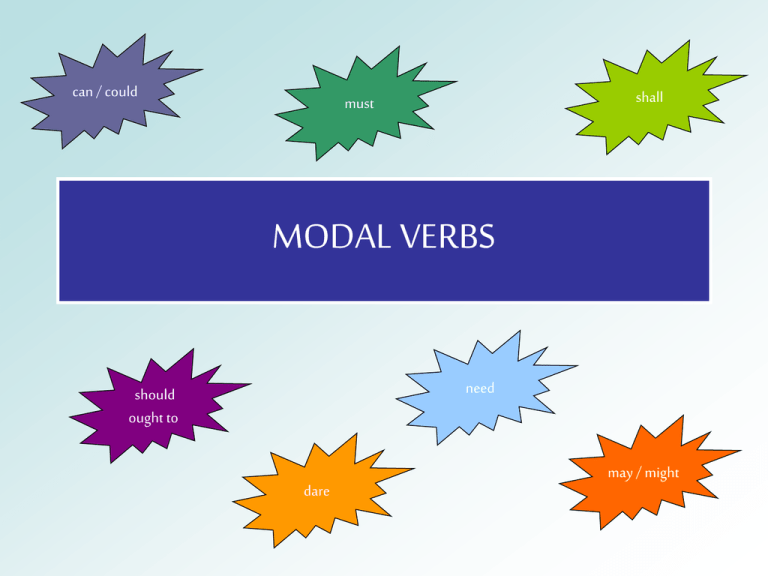
can / could
shall
must
MODAL VERBS
need
should
ought to
dare
may / might
Estes verbos pertencem a uma categoria especial de verbos porque:
Não têm infinitivo e são sempre enunciados sem “to”;
Faltam-lhes muitas formas de conjugação. Surgem normalmente no
Presente e no Pretérito, ou só no Presente;
Na 3ª pessoa do singular do Presente do Indicativo não tomam o “s”
característicos dos outros verbos;
Todos eles, à excepção do “ought” (“ought to”), são seguidos de um
verbo no infinitivo, sem “to”;
A maioria destes verbos apresenta mais do que um significado;
Na interrogativa e na negativa não necessitam do auxiliar “to do”;
seguem as regras que se aplicam ao “to be”.
CAN / COULD
Ability / Capacity
She can speak Spanish.
He can swim very well.
Possibility
You can find the meaning in the
dictionary.
Asking Permission
(informal)
Can I speak to you?
Can I come in?
Permission
(informal)
You can go out, but be back by 10
o’clock.
Denying permission
Impossibility
(informal)
You cannot drive the car.
No, you can’t speak to her at the
moment.
Informal request
Can I use your computer?
MAY / MIGHT
Asking permission
(formal)
May I please speak to the
headmaster?
Permission
(formal)
Yes, you may speak to him.
Possibility
It may be bought in an antique
shop.
Probability (mixed
with doubt)
It might rain tomorrow.
He didn’t come to school. He
might be ill.
MUST
Obligation
Necessity
You must have your passport with
you to leave the country.
I must buy a new car.
Deduction
Logical Conclusion
Strong Probability
Look at the ring. She must be
married.
She must be a doctor or a nurse.
Orders
Prohibition
You must respect the timetable.
You mustn’t park here.
SHOULD / OUGHT TO
Advice
Recommendation
You should do your homework.
You should not smoke as much.
Moral obligation, duty
You ought to respect your elders.
DARE
The absence of
courage to do
something (negative)
She dare not walk alone on the
street at night.
I dare not speak to him when he’s
angry.
Indignation / question
someone’s courage
(interrogative)
How dare you speak to me so
rudely?
It occurs chiefly in the negative and in the interrogative.
NEED
Absence of obligation
or necessity
He needn’t start yet, need he?
You needn’t have hurried.
It occurs chiefly in the negative and in the interrogative.
SHALL
Offer
Shall I open the window?
Shall I help you?
